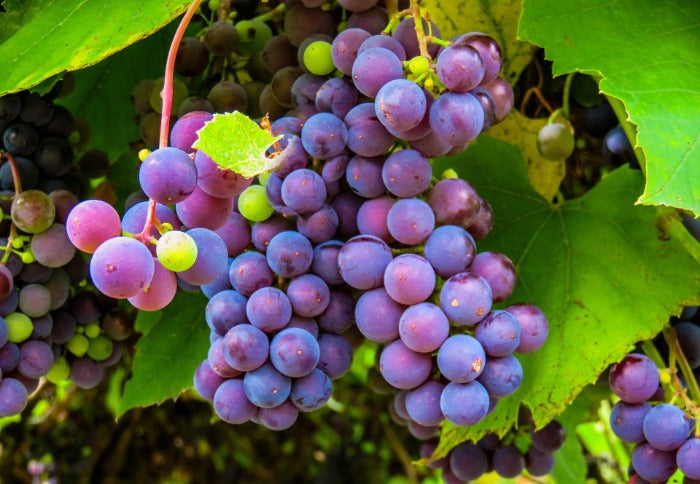Grapes are an easy choice for kids and adults alike who want a quick, healthy treat. But are they safe for your beardie, too? Can bearded dragons eat grapes?
Yes, they can...but not too often.
How Often Can Bearded Dragons Have Grapes?
Determining when your bearded dragon can have grapes depends on her overall health. If your dragon does not suffer from obesity, diabetes, or a similar health concern, then it should be safe to feed him one or two grapes once a week. If your dragon is battling any health issues, once a month is safer, and of course you should check with your vet first to make sure they are not going to harm your dragon even in such a small portion.
Healthy bearded dragons can eat a grape or two once a week without a worry. Let’s take a look at some of the nutritional benefits that make this possible:
- Lots of fiber, which aids smooth digestion and prevents constipation
- Low acidic content, which means grapes won’t burn their mouth or damage their stomach lining like some citrus fruits or higher-acid foods
- Antioxidants (especially in the skin of red grapes), which reduce and prevent inflammation, lower the risk of heart disease, and can even prevent your dragon from developing allergies
- High water content (45% to 68%), which in appropriate doses can improve kidney function and prevent dehydration
- Potassium, which regulates blood pressure
Can Bearded Dragons Eat Green, Purple, and Red Grapes?
You might be wondering at this point what color grapes we're talking about. After all, grapes can be green, purple, or red. It's all of the above! Your beardie can safely eat a grape or two, of any color, once a week, unless there are any underlying health concerns you've discussed with your vet.
Why Can’t Bearded Dragons Have Grapes All the Time?
Bearded dragons can have grapes as treats, not as part of their daily diet. Here are the main reasons why.
Choking hazard. Make sure you are feeding your dragon seedless grapes. Seeds pose a lethal threat to your beardie. Not only are they a choking hazard, but they can also cause gut impaction if swallowed, meaning they will block your beardie’s digestive tract and make it impossible for them to defecate. This can cause serious issues and death if it is not addressed right away.
Overhydration and dehydration. In high doses, fruits that are largely made up of water (like grapes) can actually cause severe dehydration in the long run, since too much hydration causes diarrhea, which in turn dehydrates your pet. Bearded dragons originally come from the Australian deserts, so they are actually used to being dehydrated for long periods of time, but they are not used to the kind of severe and perpetual dehydration that comes from over-hydrating.

Metabolic bone disease (MBD). Trust us, no pet owner wants to be dealing with MBD—it’s extremely painful for your beardie and in severe cases can cause paralysis and death! There are two reasons that too many grapes can put your dragon at risk for this debilitating disease, which is often caused by a calcium deficit:
- Oxalates. Grapes contain oxalates, a type of acid that binds with calcium in the body. So even if your beardie has a calcium-rich diet, she can be adversely affected by too many grapes since the oxalates will essentially steal away the calcium that her blood would otherwise be absorbing.
- Phosphorus. Bearded dragons should regularly eat calcium-rich foods and foods with equal proportions of calcium and phosphorus. This is because phosphorus behaves similarly to oxalates, preventing calcium from being absorbed into the bloodstream. With a whopping phosphorus to calcium ratio (5:1!), it’s easy to see why grapes should be limited.
Diabetes, tooth decay, and obesity. Grapes have a lot of sugar, which is harmful for humans and beardies alike. When dragons consume too much sugar even from natural sources like fruit, they can wind up with tooth decay, fatty liver disease, obesity, diabetes (yep, dragons can get diabetes!), and in the rare and worst-case scenario, heart failure and death.
Can Bearded Dragons Eat Grape Leaves?
Bearded dragons can eat grapes as long as it’s not too often. But can they eat grape leaves?
They sure can! In fact, since grape leaves are high in protein and calcium and low in phosphorus, they are more nutritious for dragons than the fruit itself.
Pro Tip: To serve grape leaves, simply wash and chop them, then place them in your beardie’s food bowl.
How Can Bearded Dragons Eat Grapes?
Although bearded dragons can eat grapes whole, many owners prefer to cut them up into smaller pieces to make it easier for their dragons to eat and to eliminate any possibility of choking. Cutting up the grapes also ensures that there are no seeds, since even the occasional seedless grape actually does have a seed.
Because grapes are so sweet and dragons tend to love them, you can use grapes to give your dragon an incentive to eat his veggies. This is especially helpful for younger dragons who may be currently resisting vegetables. You can easily sneak some grape pieces in with bell pepper, sweet potatoes, and kale, or any other staple veggies. Bon appetit!
If you have questions or would like to give feedback, please email us at team@dragonsdiet.com








